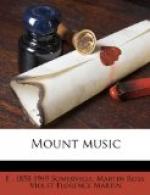He left the house. A garden-boy had seen Christian “going west the avenue”; Larry collected Scandal and Steersman from the ash-pit, and followed her “west the avenue.” He walked slowly, noting how neglected was the general aspect, how badly the avenue was in need of gravel, remembering how in the old days, the bands of slingers had never failed of ammunition, wondering if the Major were really as hard up as he thought he was; wondering if they had all turned against him, and if they would set Christian against him too. He came to the turn near the river that led to the stepping stones, and stood, in deepening depression, waiting, in the hope that she might come. It was seven o’clock, the sun was setting, the sky was warming to its last loveliness of rose and amber, and amethyst, colours with names almost as beautiful as themselves. The long stretches of grass on either side of the avenue were a fierce green, the brakes of bracken were burning orange, the long shadows of the trees that fell across the roadway were purple. The grove of yew trees, that hid the course of the river from him, had the sharpness of a silhouette cut out of dark velvet.
“Not really black,” Larry told himself, screwing up his eyes. He moved on to the grass, and kneeling, framed with his hands as much as seemed good to him. In a moment, in the intoxication of beauty, he had forgotton his troubles; Cousin Dick, singing the swan-song of the Irish landlords; Dr. Mangan, and his bewildering change of front; even Christian, and her views as to his responsibility for the tragedy of the morning, stood aside to make way for the absorbing problems of colour and composition.
The hound puppies strolled on, side by side, heads up, and high-held sterns, steering for nowhere in particular, oblivious as Larry of all save the moment as it passed. A rush of rooks came like a tide across the sky; they flew so low that the drive and rustle of their wings scared the puppies and startled Larry. He stood up and watched the multitudinous host swing westward to his own woods, and just then, a couple of hundred yards ahead, at the turn where the avenue plunged into the velvet gloom of the yew-trees, he saw Christian coming towards him, alone, save for a retinue of dogs.
If that old saying (already quoted with reference to Dick Talbot-Lowry) be true, when it asserts that “wise men live in the present, for its bounty suffices them,” then was Larry Coppinger, like his cousin, indeed a wise man. Remorse, anxiety, the wonder of the sunset, were swept from his mind, and Christian filled it like a flood. She looked very tired, and he told her so, eyeing her so closely that she turned her face from him.
“I won’t be stared at and scolded! Why shouldn’t I be tired if I like?”
“If it were only tiredness—” said Larry, with more tenderness in his voice than he knew. “Christian, they’ve been telling me that it was my fault—the rows with the tenants, and that devil coming at you this morning—and—and everything!”




